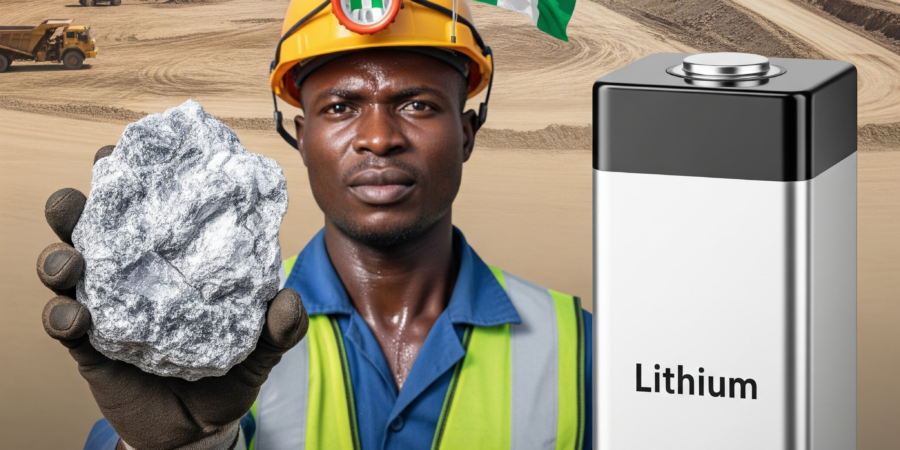The global transition to clean energy has turned lithium into “white gold,” and Nigeria is sitting on a treasure trove of this resource. With some of the world’s highest-grade lithium deposits, the country is rapidly positioning itself as a key player in the global battery value chain. But for every entrepreneur looking to tap into this boom, a clear understanding of the new regulatory landscape is non-negotiable.
This guide provides a comprehensive look at lithium in Nigeria, from its geological origins to the specific legal and regulatory steps required to mine and export it.
1. Where to Find Lithium in Nigeria: The Geological Hotspots
Lithium in Nigeria is found exclusively in pegmatite formations, often alongside other valuable minerals like tantalite, beryllium, and tin. These deposits are primarily concentrated in a “pegmatite province” that stretches across several states. The three main types of lithium ore found are spodumene, amblygonite, and lepidolite.
- North-Central Region (Spodumene, amblygonite, & Lepidolite): This region is home to some of the highest-grade lithium deposits.
- Nasarawa State: Often referred to as Nigeria’s “Lithium Hub,” with significant deposits of spodumene, amblygonite, and lepidolite in areas like Kokona, Karu, Nasarawa LGAs (Angwa-Kede, Gidan Kadiri, Agwada, Gidan Kwano, and Keffi)
- Kogi State: Known for its rich spodumene deposits, with high-grade resources reported in some areas.
- Kaduna State: Contains promising lithium resources in the southern parts of the state.
- South-West Region (Spodumene Dominant): The southwestern states are rich in spodumene, the most sought-after lithium ore.
- Oyo State: Has significant lithium reserves in areas like Komu and Awo.
- Ekiti State: Home to lepidolite deposits, often found in pegmatites.
- Kwara State: Has notable deposits of spodumene in areas like Oke Ode and Shagbe.
The grade of Nigeria’s lithium deposits is exceptional, with some pegmatites having a lithium oxide (Li₂O) content of up to 9%, which is well above the globally accepted commercial cutoff grade of 0.4%.
Our ebook, Nigeria’s Lithium Boom: A Comprehensive Guide to Mining, Trading & Export, is an indispensable resource. It provides detailed information and an in-depth analysis of the market, regulatory requirements, and key players.
2. The Legal Path to Mining & The New Value-Addition Mandate
Gone are the days of simply exporting raw lithium ore. The Nigerian government, under President Bola Tinubu, has enacted a fundamental policy shift: to get a mining license for a critical mineral like lithium, a company must have a plan to establish a processing plant within Nigeria.
- Why This Policy Matters: This “value-addition” mandate is designed to ensure Nigeria benefits from the entire lithium value chain, creating jobs and increasing export revenue. It effectively ends the practice of simple ore exportation and is a crucial point of compliance for any serious investor.
- The Process:
- Secure an Exploration License from the Nigerian Mining Cadastre Office (MCO).
- Conduct a Feasibility Study to prove a commercial quantity of lithium.
- Submit a Business Plan that includes a clear commitment to in-country processing and beneficiation.
- Obtain a Mining Lease and begin operations.
3. The Definitive Guide to Lithium Export from Nigeria
The new policy dictates that only beneficiated or processed lithium (concentrate) can be exported. The export process for this value-added product is a direct path to high-profit margins.
- Step 1: In-Country Processing: Invest in a processing plant to convert raw ore into a high-grade concentrate (typically 6% Li₂O or above).
- Step 2: Legal and Export Compliance: Obtain your Mineral Export Permit from the MSMD and your exporter’s certificate from the Nigerian Export Promotion Council (NEPC).
- Step 3: Export Logistics: Follow the standard logistics procedure, including securing a Clean Certificate of Inspection (CCI) and using a reliable freight forwarder to handle your shipment.
The government’s push for beneficiation, while creating a new investment hurdle, also creates a high-value opportunity. By moving up the value chain, you are no longer just a commodity seller; you are a key player in the global battery supply chain.
If you are a serious investor who wants to move quickly and avoid the hidden costs of navigating this new regulatory environment, our Mining & Mineral Trading Company Setup (Nigeria) service is a done-for-you solution that handles every aspect of your legal and regulatory setup, including preparing your business plan with the required value-addition commitments.
Once your business is legally established, the Nigerian Mineral Exchange provides a platform for you to sell your legally-sourced minerals to a global audience, turning your compliance into a competitive advantage.
📘 The Nigeria Mineral Trading & Licensing Blueprint (2026 Edition)
If you are serious about buying, selling, or trading minerals legally in Nigeria, you cannot afford to rely on guesswork, outdated advice, or hearsay. The regulatory environment is tightening fast, and costly mistakes now lead to permit denials, seizures, or permanent blacklisting.
That’s why we created The Nigeria Mineral Trading & Licensing Blueprint: 2026 Guide to Buying Center Licenses & Purchase Permits — an updated, clear, step-by-step, insider guide that shows you exactly how to obtain Mineral Buying Center Certificates, Purchase & Possession Permits, and related approvals without delays or regulatory traps.
This guide distills real regulatory procedures for 2026, compliance requirements, and practical insights used by serious operators — saving you months of confusion, wasted money, and avoidable risk.
If mineral trading is part of your business future, this blueprint is not optional — it’s protection.
READ ALSO:





Leave a Reply